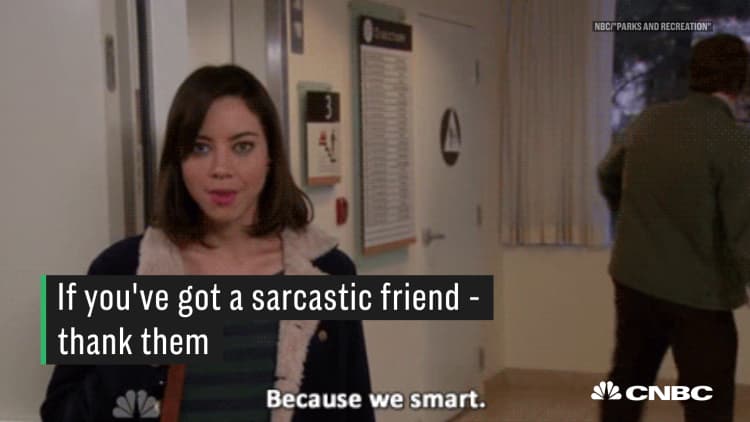Sarcasm can be off-putting or endearing. But apparently, in either case, it's smart.
At least that's what researchers from Harvard University found in a 2015 paper titled, "The highest form of intelligence: Sarcasm increases creativity for both expressers and recipients."
"Sarcasm — expressions that intend to convey their true meaning by signifying the opposite of their literal meaning — affords creative benefits," the authors of the paper wrote. Whether you're the one dishing it out or listening to it, being sarcastic makes you think more abstractly, they found.
The study involved participants doing a simulated conversation task in which they had to express or receive comments with varying degrees of sarcasm and sincerity.
To then measure how those comments affected creativity, the researchers had participants undergo a Remote Association Task, "which captures the identification of novel and meaningful connections among seemingly unrelated stimuli." For example, when someone was shown the words "manners-round-tennis," he had to come up with something logically linked to each. In this case, the answer would be "table."
Those who experienced more sarcasm — through expression or reception — in the first task were shown to be more creative and to think more abstractly in the second.

However, the researchers also observed that, in some instances, sarcasm enhanced tension. If you've consulted any speech coaches or marriage counselors, this probably isn't news to you. Psychology Today defines sarcasm as "hostility disguised as humor."
While addressing this finding, the researchers discovered that conflict arose specifically when there was already a feeling of mistrust between two people.
"While sarcasm in a non-trusting relationship fuels conflict," they wrote, "sarcasm in a trusting relationship is less harmful and may even bring individuals closer." So, as long as there's a sense of trust, sarcasm "allows individuals to reap the benefits of creativity without incurring conflict."
In light of these apparent cognitive benefits, and contrary to popular opinion, the authors endorse the use of sarcasm in the workplace.
So maybe go find out if your coworker trusts you by unleashing some of that dry wit you've been holding back. Just don't be surprised if they come back at you with an equally dry, "Ha ha."
Like this story? Like CNBC Make It on Facebook!
Don't miss: Super-agent turned CEO: How to get a job in Hollywood in 3 simple steps




